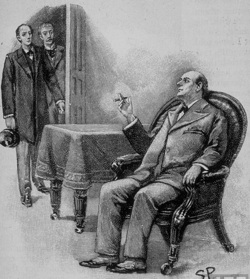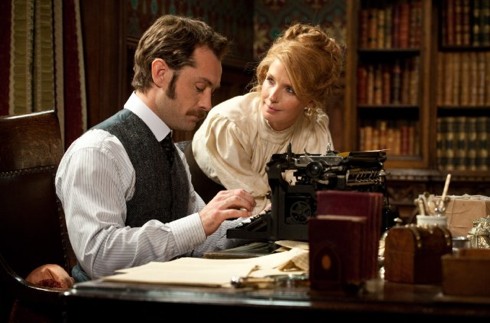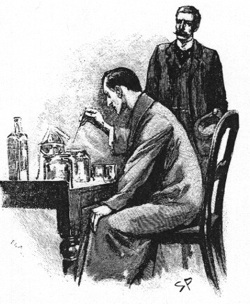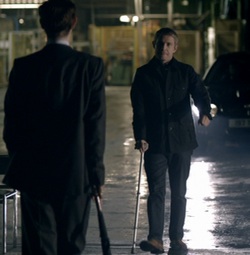All good Sherlock Holmes fans know that Doctor John Watson was injured when he went to war. He walks with a cane, and occasionally comments about the pain it causes him in the canon. So, how about a pop quiz: Where’s Watson’s war wound? I’m guessing that some of you said the leg, and some of you said the shoulder.
You’re all wrong.
Or, conversely, you’re all right. Because according to Arthur Conan Doyle, the good doctor was wounded in his shoulder and in his leg. Not two injuries—one injury that magically moves depending on the story you’re reading. It may sound awfully strange, but that is precisely what makes being a Holmes fan so much fun. In this era of devout continuity porn, the Holmes canon demands that you do something extraordinary: reconcile it yourself.
The rule of the day is flawless continuity in drama. Television shows with the most rabid fanbases are sticklers about it, the long arcs of Lost, Battlestar Galactica, Game of Thrones, and American Horror Story proving the trend and giving it more momentum each year. Perhaps sitcoms can still get away without delving into consequences and implementing change, but for the rest of television, it’s continuity or bust.
Sometimes continuity is fun; while we can’t tell how we’re all going to feel about the Avengers arc until it’s over, it’s still intriguing to watch Marvel try to run that through-line between multiple blockbuster films. But sometimes it’s just plain snobby. You’ve heard them. Those people hanging out at the bar, yammering on with an “oh, I just can’t get into Star Trek. It’s too episodic. I need something with more meat that I can really sink my teeth into. I prefer long-form storytelling.”
And there’s nothing wrong with enjoying the long-form, but the episodic has its place too. More importantly, it encourages you to do something that most people zoning out to Gossip Girl are incapable of: it encourages you to use your imagination to fill in the gaps. To make things work where they don’t. To reconcile contradictory data.
For a Holmesian, that’s a bag of candy.
 Being able to enjoy these stories as they are demands that you do a little deducting of your own. You have to decide why the war wound appears in two different places, where each story might occur on the timeline, whether or not Watson was married more than once. For example, Holmes is the son of a squire, but he and his brother never appear to take on any duties in caring for their estate. Is it because neither of them has interest and they gladly neglect their birthright? Or is it possible that Sherlock and Mycroft have an elder brother who does this? And if they do, what on earth is he like?
Being able to enjoy these stories as they are demands that you do a little deducting of your own. You have to decide why the war wound appears in two different places, where each story might occur on the timeline, whether or not Watson was married more than once. For example, Holmes is the son of a squire, but he and his brother never appear to take on any duties in caring for their estate. Is it because neither of them has interest and they gladly neglect their birthright? Or is it possible that Sherlock and Mycroft have an elder brother who does this? And if they do, what on earth is he like?
In addition, because Watson is a first person narrator (and admittedly does not always tell the truth to protect the names of clients, etc.), it is possible that any story could be deliberately misleading. Fans of Holmes call it “The Game,” and it is perhaps the most enjoyable aspect of reading Doyle’s detective stories. Sir Arthur Conan Doyle himself never seemed to be much of a fan where continuity was concerned: when he prefaced a collected volume of the short stories, he managed to not only get the years of publication wrong, but the name of one of his tales. Unlike authors today who keep journals full of careful notes and character histories, who plot each book out with a compulsive attention to detail, terrified that they might get something wrong and debunk their own creation, Doyle wasn’t particularly fussed. In fact, it’s possible that he might have made so many errors in the narrative to poke fun at the fans that he knew were obsessively cataloging every date, crime, and reference to past adventures.

Because so much must be considered and reworked with every new piece of information, it’s almost guaranteed that everyone who reads these tales will see them a bit differently. After all, it’s not as though there is any “correct” answer where Holmes continuity is concerned. We’re not going to suddenly unearth a book buried a hundred years ago where Doyle details his plans, offers a perfect Sequence-of-Events chart and explains discrepancies. So what you decide is essentially what you get to believe: provided that you know the canon well enough to make an educated hypothesis.
And that makes Sherlock Holmes sort of… belong to you. It makes him belong to everyone in a unique, very personal way. It’s really no wonder that we love him. That he endures in a way that other figures do not.

The game’s afoot, and it could be one of your greatest adventures as a reader. It’s time to play.
Emmet Asher-Perrin hopes that Watson didn’t have more than two wives, or she’d be forced to suspect that Holmes was knocking them off. You can bug her on Twitter and read more of her work here and elsewhere.











Easy on the wound thing, Watson was either mounted when he was shot by a man on the ground or a mounted gunman shot him from above. The bullet passed through his leg and shoulder.
@tudzax1, that sounds like one for the Warren Commission.
Or perhaps “The Adventure of the Grassy Knoll” … (-:
Emily, you’re my new best friend. I’m pulling my hair out about continuity in my novel at the moment–to the point that I’ve actually had nightmares about it. It’s so nice to read that it may not, in fact, be the end of the world if I describe a scar in one place in chapter six and another place in chapter twenty-six!
SLCrow@3
As a Neil Gaiman character in The Sandman story ‘The Hunt’ says: ‘You shouldn’t trust the storyteller; only trust the story’
Or perhaps “The Adventure of the Grassy Knoll” … (-:
Surely someone must have written this already. IF NOT WHY NOT.
I like what’s said here about making the series your own, interpreting the gaps in the canon in a way that personalizes it for you, that makes it your own individual creation. That’s what Star Trek fandom felt like in the ’70s and early ’80s, before TNG came along and fans were conditioned to revere Canon as a dictate from on high. Before then, there were so many gaps and inconsistencies that everyone had their own ideas of how to fill them in. Tie-in novelists like Joe Haldeman, Vonda McIntyre, and Diane Duane often filtered ST through their own individual styles and viewpoints, offering essentially incompatible but always intriguing alternative takes on how the universe worked and what was going on behind the scenes. (The quintessential example of this, perhaps, was James Blish, who peppered his episode adaptations with references to events and characters from his own Cities in Flight and other series — essentially implying that ST took place in Blish’s universe!) The authors made it their own, and fans could make it their own by picking and choosing which of the books and comics and in-universe reference works they chose to accept, or concocting convoluted schemes for reconciling them.
Im a huge fan. however i was wondering as to waatsons first wfe who was sent home in mark of the four because her mother was dead and her father was a service man, however in the The Five Orange Pips she is visiting her mother ?